If you run a high-traffic website, e-commerce store, or any other data-intensive platform, you’ve likely heard of dedicated server hosting.
But what exactly is a dedicated server and how is it different from shared hosting?
This comprehensive guide will explain everything that you need to know about dedicated servers in 2024 – from the definition and working to types, pros and cons, and tips for choosing a provider.
Okay, let’s start by understanding what dedicated hosting actually means.
Table of Contents
What is a Dedicated Server?
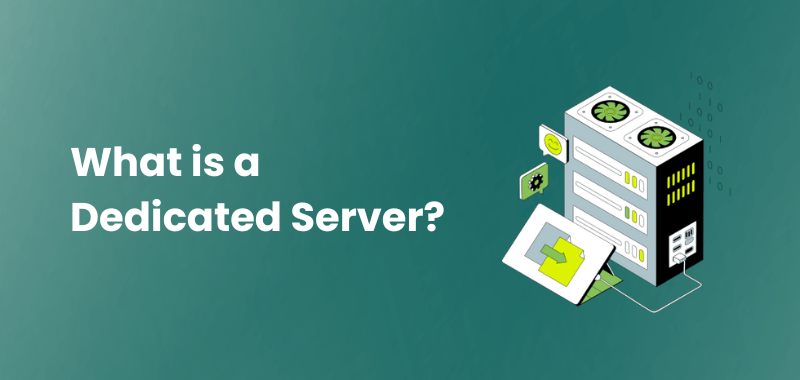
The term itself provides a hint – it essentially means a server that is solely dedicated for your use.
So when you rent a dedicated server, you have the entire server resources at your disposal.
You can imagine it like owning a 2-storey house with everything in it meant for your family only.
Compared to this, a shared server would be like living in an apartment building and sharing common facilities with other people.
In technical terms, a dedicated server guarantees these exclusive resources for your websites and applications,
- Processing Power (CPU)
- RAM (Memory)
- Storage Space (SSD or HDD)
- Network Bandwidth
And since these vital computing resources are not being shared with any other website, you get,
- Top-notch performance
- Enhanced security
- Maximum flexibility
- Ability to fully customize it as per your needs
In simple terms, dedicated servers are ideal when you need complete control over hosting for sites and apps that require top-notch quality.
Dedicated servers provide the power and performance for the demanding website needs.
Now that the basics are clear, let’s move on to benefits that make them worth the cost.
Why Choose Dedicated Hosting?
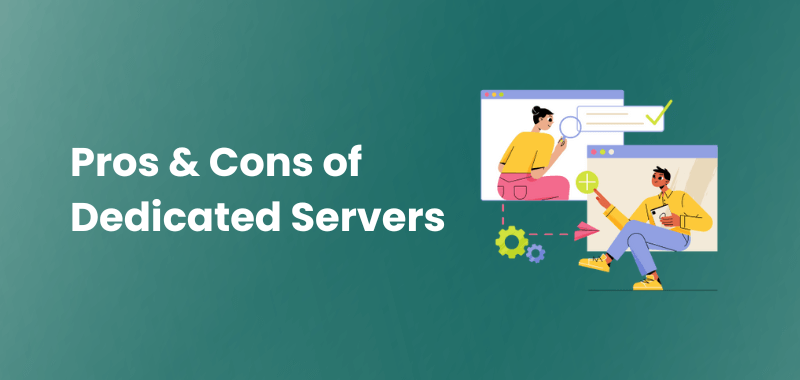
Dedicated hosting brings a lot of advantages over shared hosting in areas like speed, security, scalability, and support.
Let’s see the benefits of dedicated hosting,
Key Benefits of Dedicated Hosting
While costlier than shared hosting, dedicated servers overcome many frustrations like slow speed, limited storage, etc. with clear advantages,
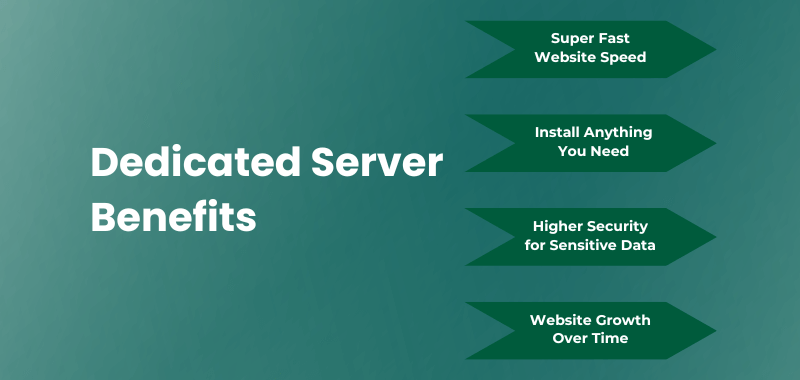
1. Super Fast Website Speed
Ever visited websites that take forever to load? Annoying, right? Shared servers often get congested and slow everything down.
But, Dedicated servers give guaranteed RAM and processor cores solely focused on running your website smoothly.
Pages load in 1-2 seconds even when your online store runs busy discount sales!
No more frustratingly slow shopping cart checkouts. Dedicated resources keep your website running smoothly and quickly.
2. Install Anything You Need
Do you use custom web apps? Shared servers limit what software you can install.
Dedicated servers let you set up anything required since you have full admin rights.
For example, you can easily add special databases, analytics tools, automation scripts, etc. It gives great flexibility for advanced users and developers!
3. Higher Security for Sensitive Data
If your website takes appointments or stores financial data, security is very important.
On shared hosting, weaknesses in other sites can expose your site to hackers too!
With dedicated hosting, it’s like living in an isolated house with tall walls. Your valuable data stays protected through restricted access and better firewalls.
4. Website Growth Over Time
As your business grows, more visitors will come. Shared servers hit traffic limits that force expensive upgrades.
But dedicated servers scale up as YOU need – more storage, power, and bandwidth. No interruptions.
Besides, Dedicated servers can smoothly scale up space, computing, and bandwidth as your website growth requires without interruptions.
You can handle exponential traffic surges expected during campaigns easily.
Now let’s look at some potential drawbacks.
Downsides of Dedicated Hosting
Mainly two aspects need consideration,
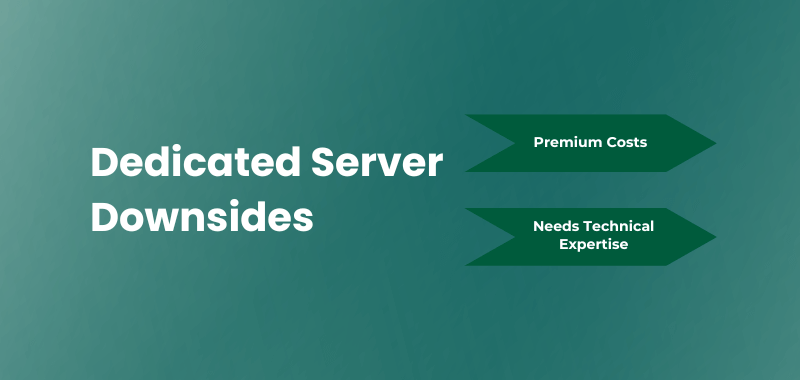
1. Premium Costs
Dedicated servers cost more because of the better infrastructure quality they provide.
Entry levels start around $100 per month, going up to $400+ for enterprise features. This may be too pricey for small & new websites.
But think long term – dedicated hosting can accelerate revenue growth much faster to justify the investment.
2. Needs Technical Expertise
Dedicated servers expect you to have decent tech skills for handling server management tasks like:
- Software updates,
- Security patching,
- Backup scheduling, and
- Performance tuning.
Or you can work with an expert system admin, or choose managed plans that ease server admin at added fees.
While limitations exist, dedicated web hosting removes barriers to delivering world-class website experiences that boost online revenue!
Now that you know the pros and cons, let’s look at common dedicated hosting plan types.
Types of Dedicated Servers
Not all dedicated servers are created equal. There are three main types that offer different levels of price, specs, and performance. These are
1. Entry-level dedicated servers
2. Business-level dedicated servers
3. Enterprise-level dedicated servers
Let’s see these three types of dedicated servers in detail below,
1
Entry-Level Dedicated Servers
- Best suited for small businesses, personal projects, and low to medium-traffic websites such as blogs or small online stores.
- Pricing is affordable, usually between $100-$200 per month.
- Hardware specifications include quad or hex core processors, 16-32GB of RAM, 1-2TB of storage, and 100Mbps-1Gbps network bandwidth.
- Performance is decent but cannot handle very large workloads or traffic spikes. Security and control are better than shared servers though.
2
Business-Class Dedicated Servers
- Designed for medium to large enterprises, e-commerce stores, SaaS apps, gaming servers, etc.
- Pricing ranges from $150-$400 per month.
- Hardware includes octa or dodeca-core CPUs, 32-64GB RAM, 2-4TB storage, and 1-10Gbps bandwidth.
- It can support high loads and hundreds of thousands of monthly visitors. Ideal for mission-critical apps.
3
Enterprise-Grade or High-Performance Servers
- Meant for large corporations, Fortune 500 companies, and very high-traffic websites.
- The price point is $400-$1000+ per month.
- Hardware has 16 cores or more, 64-128GB+ RAM, 4-8TB+ SSD storage, and 10Gbps or faster networks.
- Handles extremely demanding workloads easily, perfect for big data and analytics.
Here is a quick comparison of how key aspects differ between shared hosting and dedicated hosting.
| Parameter | Shared Hosting | Dedicated Hosting |
| Server Space | Shared with hundreds of other sites | Completely dedicated to your site |
| Control Level | Limited control via cPanel | Full admin access to server |
| Customization | Minimal | Fully customizable hardware & software |
| Cost | Cheapest option (eg. $5/month) | More expensive (eg. $100+/month) |
| Performance | Unpredictable slowdowns due to overcrowding | Consistently fast as all resources dedicated to you |
| Security | Lower since open to attacks on other sites on same server | Higher security and isolation |
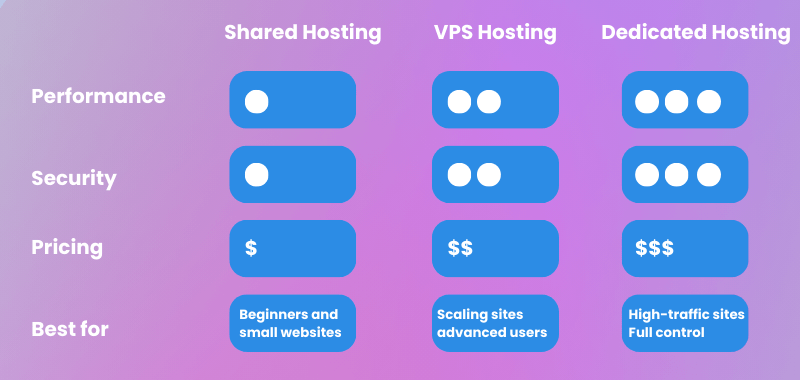
Overall, dedicated hosting provides superior performance, speed, security, and control – but comes at a higher price.
Who Needs Dedicated Hosting?
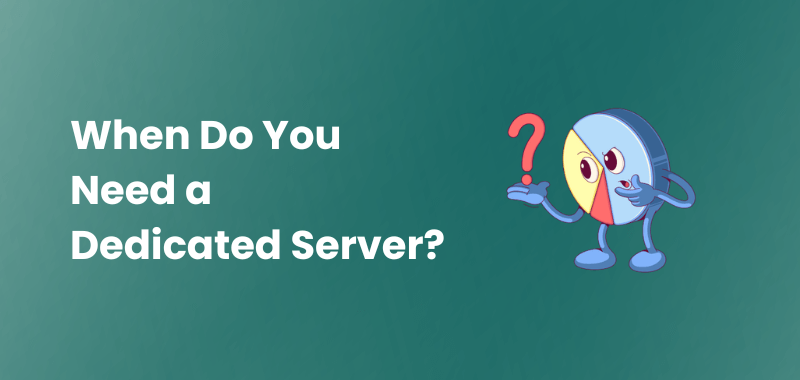
Dedicated hosting brings the most value to certain types of websites and use cases. It likely makes sense for you if,
1. Your Website Gets High Traffic
Shared servers struggle once you exceed roughly 3,000 visits per day and are outright unsuitable beyond 20,000+ visitors per day.
The limited computing resources lead to slow loading, timeouts, and crashes.
Dedicated servers easily handle heavy traffic from hundreds of thousands or even millions of visitors per month.
So, no more turning away users due to capacity issues during traffic surges.
2. Fast File Transfers Are Required
Dedicated hosting is ideal for websites that repeatedly transfer large files like cloud storage and FTP servers. Because it provides abundant disk space to store files and high bandwidth allocations to handle large file transfers without limitations.
3. You Host CPU-Intensive Web Apps
If you are running data science or multimedia apps that need a lot of processing power, a dedicated server is best. These apps do complex calculations and number crunching.
Shared hosting won’t work well because its CPUs are not strong enough. The apps will take very long to finish.
But dedicated servers have powerful CPUs perfect for these apps. The fast processors can do all the complex math and rendering quickly. This speeds up the work.
So for data analytics, machine learning, and multimedia rendering, dedicated hosting provides the immense processing power needed to finish fast.
4. 100% Uptime Is Critical
Websites like online stores and booking sites need to stay online all the time.
If they go down for even 5-10 minutes, they can lose lots of money from missed sales or bookings.
Dedicated hosting is very reliable. The servers have backup power and internet lines. So if one fails, the other kicks in. This prevents downtime.
The reliable servers and redundancies ensure these sites stay online 24/7.
So they won’t miss any business and lose money from downtime. Dedicated hosting keeps them running smoothly without failures.
5. Your Website Handles Sensitive Data
Websites like banks and healthcare sites store people’s personal information. This information must be kept safe and secure.
Dedicated servers help keep the information private and protected.
The servers are isolated, meaning no one else can access them. There are also access controls, which limit who can view or change data.
This prevents hackers from getting into the servers and stealing private user information.
Overall, dedicated hosting provides very strong security for sensitive information.
6. You Need a Custom Server Infrastructure
Some websites have special or complex designs. Shared hosting only lets you use the standard settings.
But Dedicated servers let you customize the server’s software and apps however you want.
In summary – If you ask when is the right time to upgrade to dedicated hosting?
It depends on each website. Look at how fast it is growing and how much traffic it gets now. Think about what it will need in the future. This helps decide when to upgrade.
Even if you don’t need a dedicated server yet, planning for future growth is smart.
Consider when your site might outgrow shared hosting limits. This helps pick the ideal time to switch to dedicated for more power and flexibility.
How to Choose Dedicated Server Hosting?
With the number of plans and custom options to weigh, decision-making can get overwhelming.
Follow a step-by-step process focusing on key parameters.
1. Consider Website Needs
When choosing a dedicated server, the first thing to consider is your website’s needs.
Estimate the amount of traffic and bandwidth required per day or month. This will determine the processing power, RAM, and storage space required.
2. Processing Power
The server’s CPU cores directly impact its processing speed and ability to handle multiple requests simultaneously.
For a high-traffic website, a server with a powerful multi-core processor is essential.
3. RAM
The amount of RAM determines how much data the server can access quickly at once.
More RAM results in faster loading and better performance, especially for data-intensive sites. Choose a server with ample RAM for your needs.
4. Storage Space
The storage capacity required depends on the amount of data like files, images, and videos hosted on the site. Opt for more storage if you need to store large volumes of data.
5. Bandwidth
Higher bandwidth enables the server to transfer more data per second. It’s vital for high-traffic sites or transferring large files.
6. Security
Reputable dedicated server providers offer robust security like firewalls, intrusion detection, malware monitoring, and DDoS mitigation. Select features that adequately protect your site.
7. Price
Lastly, compare prices between providers thoroughly. Reputable web hosts with a long history in dedicated server hosting tend to offer the best value.
Prioritize your website’s needs and choose a server with specs that match or exceed them, while staying within your budget.
FAQs
Below are the most frequently asked questions about dedicated server hosting.
A dedicated server is a single physical server reserved for one user. Some of the benefits are full control, customization, high performance, and security.
Dedicated hosting is more expensive, complex to manage, and has higher upfront costs than shared hosting plans.
Dedicated hosting provides full control over resources, maximum performance, privacy, and customization for complex or high-traffic sites.
Businesses with high-traffic sites, large databases, or complex apps use dedicated servers for improved performance and resources.
Use dedicated hosting when your site has outgrown shared plans and needs dedicated resources, customization, and the highest performance.
In dedicated hosting, all system resources exclusively serve your website while VPS (Virtual Private Server) is divided into discrete virtual environments, and your website shares the same physical hardware.
Also Read:
- What is Cloud Hosting? A Beginner’s Guide for 2024
- Best VPS Hosting Services To Grow Your Website in 2024
- Best Managed WordPress Hosting for Maximum Performance in 2024
- Top Reliable Web Hosts to Get Free .Com Domain for 1 Year in 2024
- Best Podcast Hosting 2024 to Create & Monetize Your Podcasts
- Managed Hosting vs Shared Hosting: Which Is The Best Fit For Your Website In 2024?
- Best Web Hosting Deals 2024: Save up to 90% on Reliable Services
- Top Sites To Buy Expired Domains in 2024
- Best Web Hosting Free Trials in 2024
Final Thoughts about Dedicated Server
Ultimately, dedicated hosting is ideal for your website or application if it requires uncompromising performance, security, and customization.
While costlier than shared plans initially, a dedicated server will pay for itself over time by enabling uninterrupted growth for your business.
The flexibility to scale resources on-demand prevents costly disruptions too.
For the smooth functioning of your business-critical website, a dedicated server is an investment that will deliver immense value.
While assessing your needs thoroughly first is prudent, the advantages certainly make dedicated hosting worthwhile if you have a high-traffic site ready to reach the next level.
With clarity on how dedicated servers work, their types, pros, and cons, you can now make an informed hosting decision.